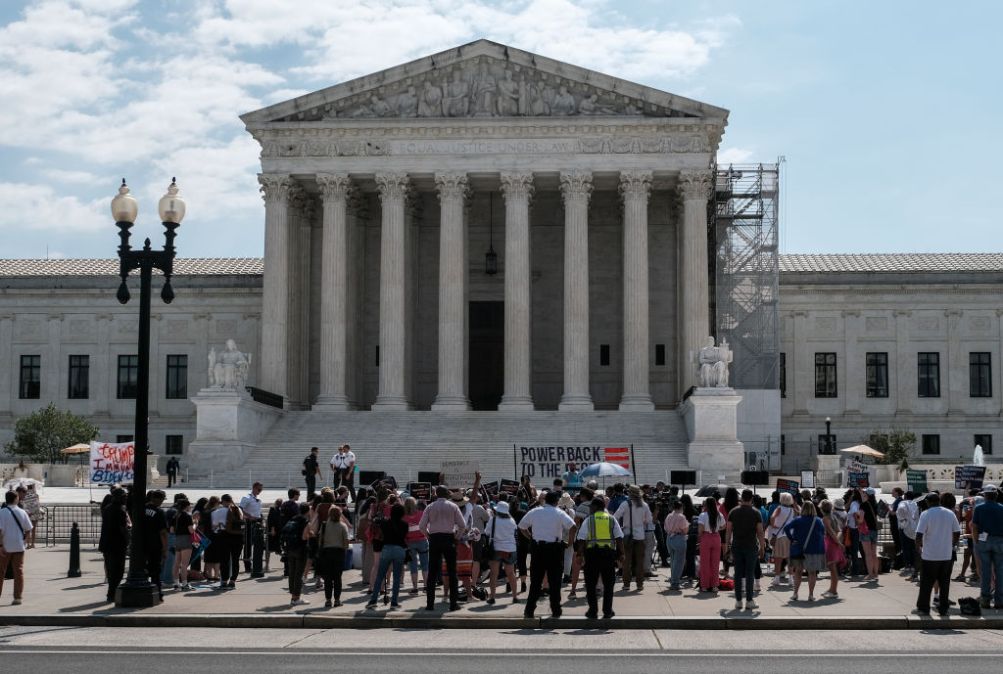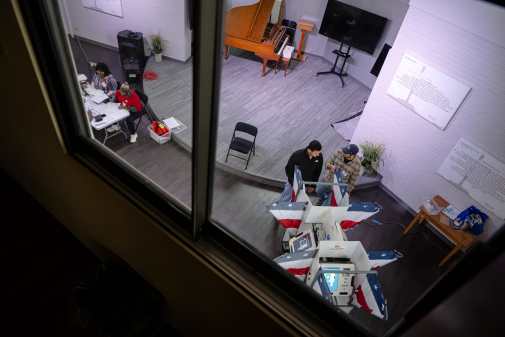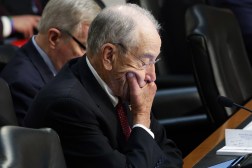Supreme Court hands Trump immunity for some attacks on election system

A ruling by the Supreme Court on Monday that found the president of the United States has absolute immunity from criminal prosecution for official acts would potentially legalize much of the election subversion work carried out by President Donald Trump in the lead-up to the Jan. 6 attack on the U.S. Capitol, election and civic groups warned.
In a 6-3 decision, the court’s conservative majority ruled that presidents must be able to operate the executive branch “without undue caution” of potential criminal liability when carrying out “official acts” and that Trump is immune from criminal prosecution related to many of his actions to stay in power, including his attempt to pressure the Justice Department to aid in subverting the election.
The court’s ruling draws a distinction between “official” and “unofficial” acts, noting that unofficial acts are not covered by presidential immunity. The Supreme Court asked a lower court to resolve the question of whether Trump’s other alleged actions to keep hold of the White House, such as drumming up slates of fake electors, also fall within the bounds of his official powers — a process that means the case brought by Special Counsel Jack Smith is unlikely to be resolved before this fall’s election.
Election experts said the ruling provides unprecedented authority to the executive to deem nearly all of its actions “official acts” and thus evade prosecution, conceivably capturing most of the actions Trump and his allies took when attempting to overturn the 2020 election results.
David Becker, executive director of the Center for Election Innovation and Research, called the definition and breadth of immunity granted by the Supreme Court for official presidential acts “incredibly broad, and in my mind, deeply disturbing.”
“I think putting aside this particular prosecution, for any unscrupulous individual seated in the Oval Office who might lose an election, the way I read this opinion is it could be a roadmap for those seeking to stay in power,” Becker told reporters shortly after the opinion was released.
Becker said that while claims that Trump incited violence through social media and speeches are still technically alive in lower courts, he noted that the Supreme Court’s ruling found that the president’s communications are “likely to fall comfortably within the outer perimeter of his official duties.”
Eric Segall, a constitutional law scholar at Georgia State University’s College of Law and author of “Supreme Myths: Why the Supreme Court Is Not a Court and Its Justices Are Not Judges,” told CyberScoop that the court’s decision could not only impact Special Counsel Jack Smith’s case in D.C., but it could also make it far more difficult to prove criminal intent for other cases related to election subversion, such as the one playing out in Fulton County, Ga.
Because the ruling deemed executive branch communications and other acts inadmissible as evidence of motive when distinguishing between official and unofficial presidential acts, Segall said it allows broad flexibility for Trump to claim that his calls to Georgia Secretary of State Brad Raffensperger seeking to overturn the state election results were part of his constitutional duty to “take care that the laws are faithfully executed.”
“The president is going to say, ‘I believe sincerely that the election was fraudulent,’” Segall said. “Without any method of proving the president’s state of mind, he can always say, ‘what I did, I did as Commander in Chief and is congruent with my responsibilities.’”
The decision, Trump vs. United States, stemmed from a lawsuit brought by Trump last year seeking to dismiss a federal indictment related to his efforts to stay in power after losing the 2020 election to President Joe Biden.
Monday’s ruling concluded that many of the alleged actions by Trump that provide the basis for the federal indictment are out of bounds due to immunity for actions “performed within the outer perimeter” of the president’s “official responsibilities,” Chief Justice John Roberts wrote on behalf of the majority.
Those official responsibilities include communications with other members of the executive branch, including Trump’s conversations with acting Attorney General Jeffrey Rosen in 2020 and 2021 in which he reportedly pressed Rosen to publicly validate claims of election fraud and file briefs on behalf of the Department of Justice to support the president’s legal efforts, the court said.
The court said Trump is also entitled to presumptive immunity on any charges stemming from his conversations with then-Vice President Mike Pence, whom he urged to refuse to certify the vote count in Congress on Jan. 6.
Less clear is whether the ruling will convey immunity to Trump for other actions taken to undermine the election, including a plot to work with state officials to nominate fraudulent slates of electors. In its ruling, the Supreme Court asked a federal district court to resolve the question of whether such actions would fall within the scope of the president’s official powers.
In a dissent, Justice Sonia Sotomayor wrote that the majority’s opinion “narrows the conduct considered ‘unofficial’ almost to a nullity” and that the indictment against Trump “paints a stark portrait of a President desperate to stay in power.”
She also took direct aim at the majority’s view that the actions described in the indictment touch on core elements of executive branch duties.
“Trump was not criminally indicted for taking actions that the Constitution places in the unassailable core of Executive power. He was not charged, for example, with illegally wielding the Presidency’s pardon power or veto power or appointment power or even removal power,” Sotomayor wrote. “Instead, Trump was charged with a conspiracy to commit fraud to subvert the Presidential election.”
Trump celebrated the court’s decision on Truth Social, the social networking platform he started after leaving office. “BIG WIN FOR OUR CONSTITUTION AND DEMOCRACY. PROUD TO BE AN AMERICAN!” Trump wrote.
The decision sparked outrage among Democrats, who said the Supreme Court’s ruling threatens to broadly shield sitting presidents who act to undermine the legitimacy of an election or subvert the outcome.
Rep. Joe Morelle, D-N.Y., said the court’s decision “further erodes the public’s confidence in our institutions” and greatly increases the chances that Americans won’t get a decisive answer on Trump’s criminal culpability for his actions following the 2020 election.
“We saw in real time how, at Donald Trump’s direction, the former president’s armed supporters violently stormed the Capitol on January 6, 2021, to stop the peaceful transfer of power. The former president must be held accountable for his decisions, and I urge the lower court to expeditiously consider the questions referred to it.”
Robert Weissman, president of Public Citizen, a left-leaning nonprofit consumer advocacy group, said the court’s decision “endangers our democracy” and that lower courts need to move swiftly to resolve the case..
“If we don’t get a verdict in this case before Election Day, and if Trump is re-elected, Trump will have gotten what he desperately wanted from the court — a lack of accountability for the part he played in the January 6 insurrection,” Weissman said in a statement.
This story was updated July 2, 2024 with comments from Eric Segall.






